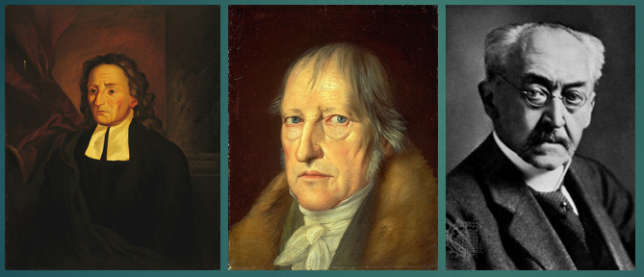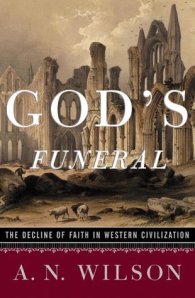
.
“Vagueness as to what is meant by Christ’s historicity must necessarily result in vague and indecisive theologies of history.” — J.W. Montgomery, Where is History Going? 1969, p. 185
I plan on getting to my posts dealing with Lutheran apologetics soon. First though, this series (which will lay some good groundwork for those forthcoming posts).
In recent posts, “Daring to Deny Darwin” and “The ‘Upside’ of Being a Gadget”, I talked about one of the great enemies of the Christian faith: philosophical naturalism.
(and I have characterized one of the most modern forms of philosophical naturalism – existing from the 17th century and up – as the modern scientific and technological mindset, or MSTM, which we could also call “mechanized naturalism” or “mechanicism”).
I also recently posted a very short critique of Erlangen theology. One aspect of this kind of theology is that it attempts to take into account some of the more creative ideas and methods of the great 19th c. German philosopher Georg Wilhelm Friedrich Hegel. Hegel is perhaps the foremost proponent of “historicism”, which is a philosophy that originally arose in order to counter some of the negative aspects (and fruit) of more modern naturalistic views.* (more on this specifically in part II of the series).
That said, historicism is another great enemy of the Christian faith. I would contend that the modern form of philosophical naturalism/mechnicism is like the drunk man who gets on the horse and falls off on one side. Historicism is the basic counter-response, and the drunk man falling off the other side of the horse. The one who tries to utilize both in tandem also cannot balance on the horse. Of course the drunk man in our analogy is a symbol of fallen man, particularly fallen man at the utter heights of his fallen intellectual powers (there is no denying he is clever and aware of much that is true!) – natural man’s own view of himself is that he is the “reasonable man”.
In this series we will take a look at historicism while also talking about the importance of real history.
We begin…
Who am I? Where am I from? Where am I going? What is the meaning of life?
These are questions about historical matters that none of us can fail to ask or think about. That said, naturalism and historicism, which I have said are two great philosophical enemies of the Christian faith, complicate terribly our potential answers to these questions.
 These days, you will certainly not get sage advice like the that given to Edwin, the 7th century King of Northumbria (now northern England and south-east Scotland). After hearing the Gospel preached, the King proposed to convert to Christianity and one of his chief advisors, according to the Venerable Bede, said this:
These days, you will certainly not get sage advice like the that given to Edwin, the 7th century King of Northumbria (now northern England and south-east Scotland). After hearing the Gospel preached, the King proposed to convert to Christianity and one of his chief advisors, according to the Venerable Bede, said this:
“Your Majesty, when we compare the present life of man on earth with that time of which we have no knowledge, it seems to me like the swift flight of a single sparrow through the banqueting-hall where you are sitting at dinner on a winter’s day with your thegns and counsellors. In the midst there is a comforting fire to warm the hall; outside the storms of winter rain or snow are raging. This sparrow flies swiftly in through one door of the hall, and out through another. While he is inside, he is safe from the winter storms; but after a moment of comfort, he vanishes from sight into the wintry world from which he came. Even so, man appears on earth for a little while; but of what went before this life or of what follows, we know nothing. Therefore, if this new teaching has brought any more certain knowledge, it seems only right that we should follow it.”** (story from Bede, The Ecclesiastical History of the English People, 731).
Answers such as these were at one time seen as being eminently reasonable, especially in an age where much history had been lost. To say the least, this is no longer the case.
Starting with the Renaissance but with the Enlightenment in particular, new ideas and new discoveries were in the air… Many of these ideas, some good and some bad, would find their most fulsome flowering in the thought of the great German philosopher Georg Wilhelm Friedrich Hegel. (though starting out with a man by the name of Vico – see next post). While it is fair to say that Hegel is more known as an idealist than a historicist, his work is associated with both of these streams of thought, which tend to merge.
In order to give you a bit of the flavor of the kind of influence Hegel enjoyed and the fruits his ideas bore, here is a lengthy – but very interesting – quote from the book “God’s Funeral” by A.N. Wilson. In this quote, Wilson follows some of the history of a highly influential scholar and professor named Benjamin Jowett (1817-1893), who is little known today but in his own day “turns up in a thousand nineteenth-century anecdotes”. Please note that Wilson himself is a septic skeptic – I will refrain from editorializing too much about his own rather skewed take on things:

“Unlike most Oxford men of his age, [Jowett] knew that there was an alternative [to self-defeating Humean empiricism and “insulting” revealed religion]. When his friend Arthur Penrhyn Stanley (destined to be Dean of Westminster – he is the little boy Arthur who risks the ridicule of his dormitory in Tom Brown’s Schooldays by daring to kneel down and say his prayers) had finished his magnificent hagiography of his hero Dr. Arnold, Jowett proposed that the pair of them take a holiday in Germany. They set off in the summer of 1814, with Liddell and Scott’s enormous and newly published Greek Lexicon, and with one copy of Kant’s Kritik der reinen Vernunft, which they took it in turn to read and analyse. They attended various philosophical conferences, but the most exciting and important thing Jowett did was to meet Erdmann of Halle – the meeting took place in Dresden. Erdmann was Hegel’s representative on earth. The two young Englishmen were thirteen years too late to meet Hegel himself, but meeting Erdmann was the next best thing.
Jowett never became a full-blown Hegelian. There was always a part of him which, as Geoffrey Faber his biographer says, was ‘salty’ and empirical; there was an even larger part of him which was so Platonist that it did not need Hegel. A typical Jowettism, this:
‘Hegel is untrue, I sometimes fancy, not in the sense of being erroneous, but practically, because it is a consciousness of truth, becoming thereby error. It is very difficult to express what I mean, for it is something which does not make me value Hegel the less as a philosopher. The problem of Truth idealized and yet in action, he does not seem to me to have solved; the Gospel of St. John does.”
There is a brilliance about this remark. Of course, all the churchy bigots regarded Jowett as a complete heretic, and he spend his life, after he came to fame and prominence, being denounced by them. But he was something of a mystic, so that although he never for a moment believed in the Thirty-nine Articles or the literal truth of miracle-stories in the New Testament, he believed deeply in God and Christ.
[editorial comment: OK…]
At first glance, certainly, idealism, the German version, seemed like the best approach for an attack on the dead hand of materialism and empiricism. The extent to which Hegel’s God – mentioned so frequently in that philosopher’s works – is the same God of Christianity can always be a subject of debate. Is Hegel’s God Personal? The community of the Spirit in Hegel consists in the Spiritual Community, or the Church. But this is not understood as [Cardinal] Newman and friends would have understood it in using the word. It is not the laying-on of apostolic hands, still less a sacramental ‘magic’ which constitutes the Hegelian community. The perfected community of enlightened ones is itself, in Hegel’s world, God. And he chose, when describing this community, and impersonal word, Gemeinde, ‘whose ordinary meaning excludes any idea of personal unity’.
Jowett was a great teacher rather than himself an original metaphysician. This is what makes his visit to Germany so important – and so different from [Edward] Pusey’s visit to Gottingen and Berlin nearly twenty years before. Whereas Pusey came back to England and decided that there were storms ahead and it was time to batten down the hatches, Jowett returned with a feeling of liberation…”

Relevance for us? Stories like this have been recapitulated many a time by many a young theological intellectual (perhaps particularly those intellectuals studying in Germany). German thinkers – with their intoxicatingly comprehensive and systematic foci, have loomed large in world history…. (check out this paper and learn about Bad Boll – you will need to download this to read due to formatting issues)
Hegel’s style of thought was to exercise much influence in 19th and 20th century theology. Of course in the twentieth century there was also resistance to his thought, particularly from the Kierkegaard-influenced neo-Orthodoxy, led by Karl Barth. That said, for all the good that can be found in neo-Orthodoxy, it was lacking in many respects, including its unwillingness to speak about the matter of history and the Christian faith in a way that did not cause utter confusion.
The late theologian George A. Buttrick wrote a very interesting book in the early 1960s called Christ and History. He is clearly influenced by men like Karl Barth and his neo-orthodoxy, and his comments below a) sound pretty good and yet, b) sound a bit strange, with some jargon that may be unfamiliar to us:
“Is thought primarily scientific or philosophical or theological? Or is it historical, that is, so constituted as to be able by nature to respond to the onsets of God in history? At any rate, the Bible is history… the Bible is history, and sacred history and faith-history… Bible history is eschatological…Bible history is focused history… [it] sets a Year One in the midst of history…” — George A Buttrick, Christ and History, 1963, p. 18, 22, 24-26
![Stanford Encyclopedia of Philosophy on Hegel: "the philosopher should seek to discover the rational within the real—not to impose the rational upon the real." Hegel himself: “History is the process whereby the spirit discovers itself and its own concept” Hegel: on the wrong side of history[‘s Author]](https://infanttheology.files.wordpress.com/2013/09/hegel.jpg)
Here, it seems to me, is the crux: against Hegel, the Christian must assert that there are some statements made on earth that remain and always will remain true. Permanent.**** Over against those who would employ Hegel to re-imagine the historic Christian faith in this or that way, we must assert that there is no “salvation history” that should be held as distinct from larger (or smaller, according to some theologians) “world history”. In short, “history is history is history”. That said, I think that some will, understandably, want to be nuanced in their understandings of these things, and in part II we will get on that road by taking a closer look at historicism….
(part II in a couple days)
FIN
Notes:
*That said, in many cases historicism – in the minds of many men at least – is also frequently thought to be highly compatible with philosophical naturalism/mechanicism (particularly as regards what is the chronological and mechanical process of evolution and accompanying ideas of progress and goals). Part II will talk about this more.
**”The King did become a Christian and. St. Paulinus[, who had preached to him,] went on to convert many in the kingdom of Northumbria, notably the great Hilda who received the monastic habit from our own St. Aidan who served the next king of Northumbria after Edwin, Oswald.” (from here: http://www.ancientfaith.com/podcasts/voicefromisles/the_sparrow_in_the_hall)
*** Full quote from my pastor: “Pieper was writing his critique of Erlangen before World War I (for all intents and purposes), before Barth and Bultmann came on the scene, before Barth and Gogarten had their “throw-down” about whether or not God can be known through history, or even creation. Pieper therefore was, to a certain extent, “like the scout that saw the opposing force coming, and galloped back to try to warn the garrison of what was coming.” Therefore he can be forgiven somewhat for not being as prescient as we now can be about the topic post Barth…”
**** In this view then, the notion of positive law, for example, cannot simply be thought to be the mere product and catalyst of social change, but is rather is intimately connected with things that are permanent and transcendent, outside of us.
Images: Wikipedia ; sparrow: https://www.flickr.com/photos/witchietaitai/3340710907/in/photostream/ ; Harnack pic: global.britannica.com











